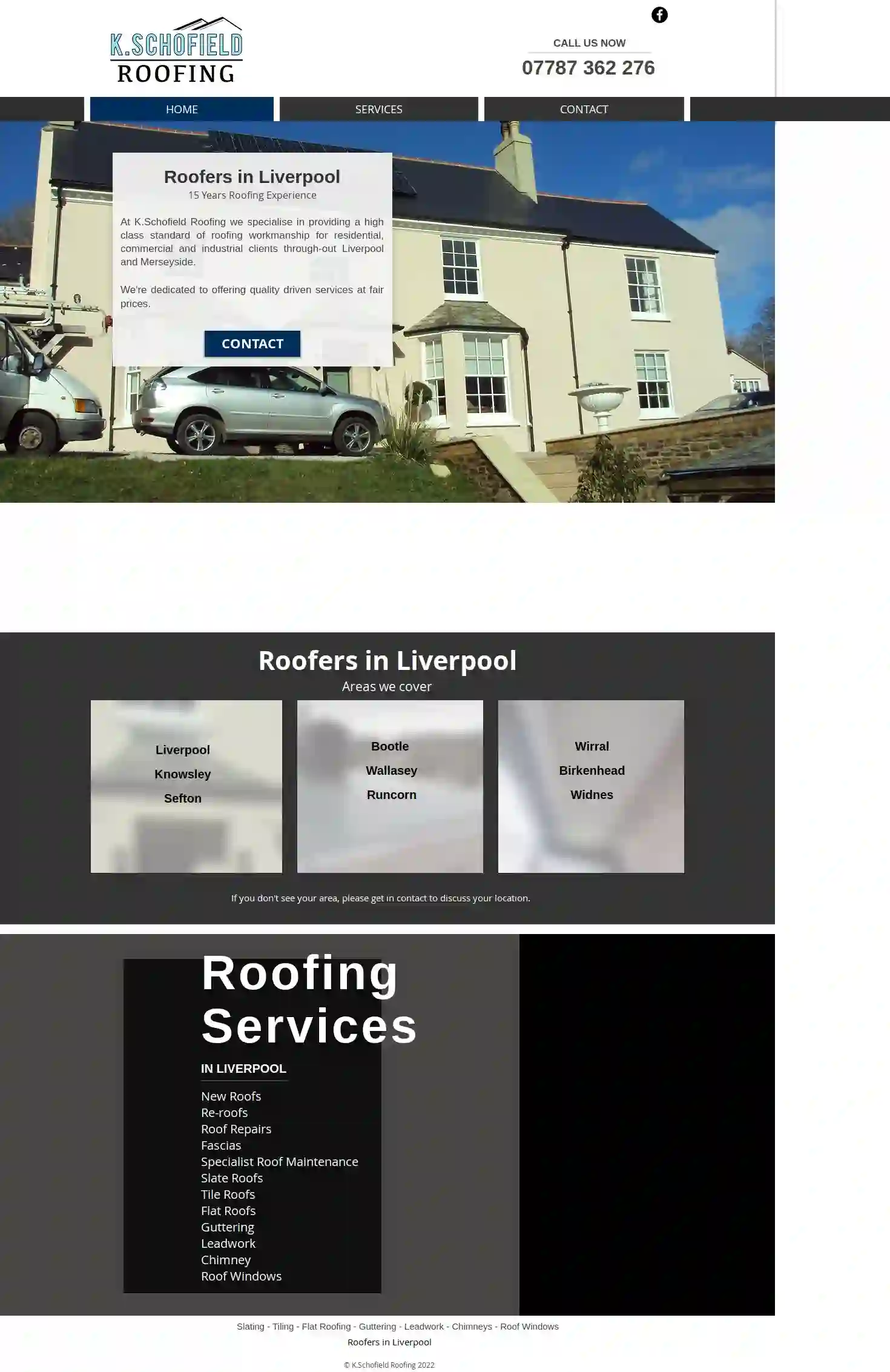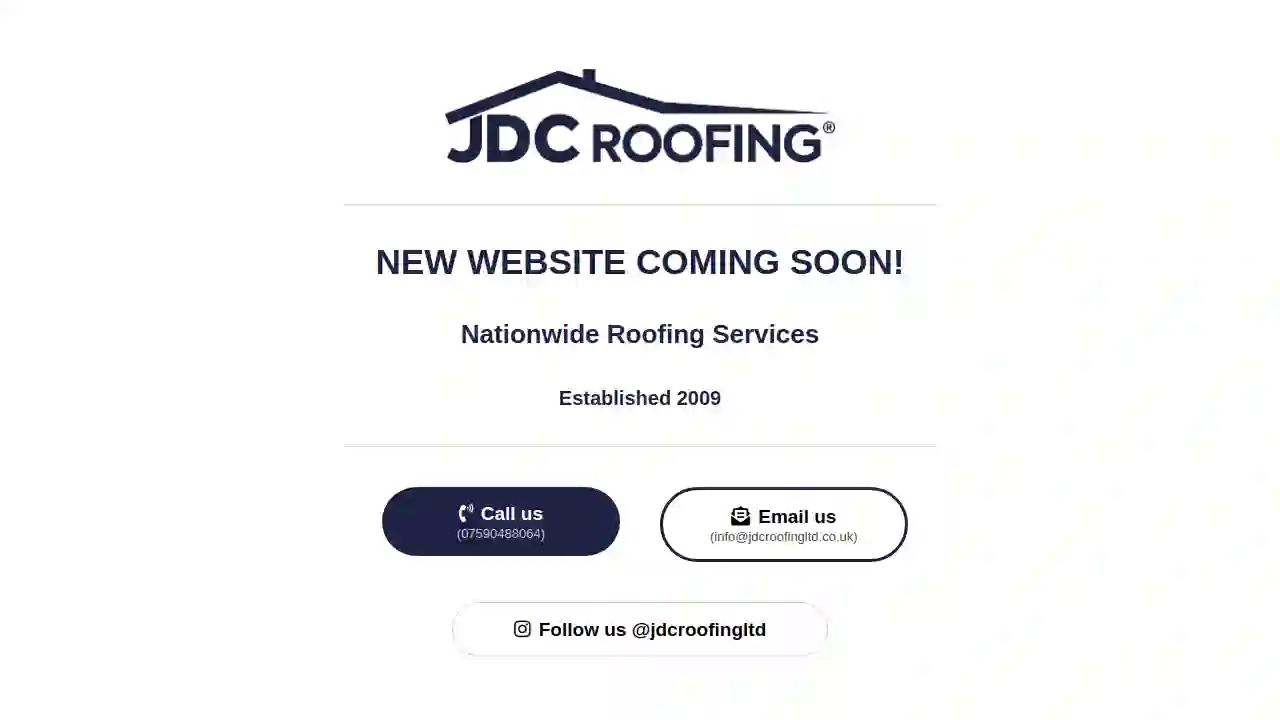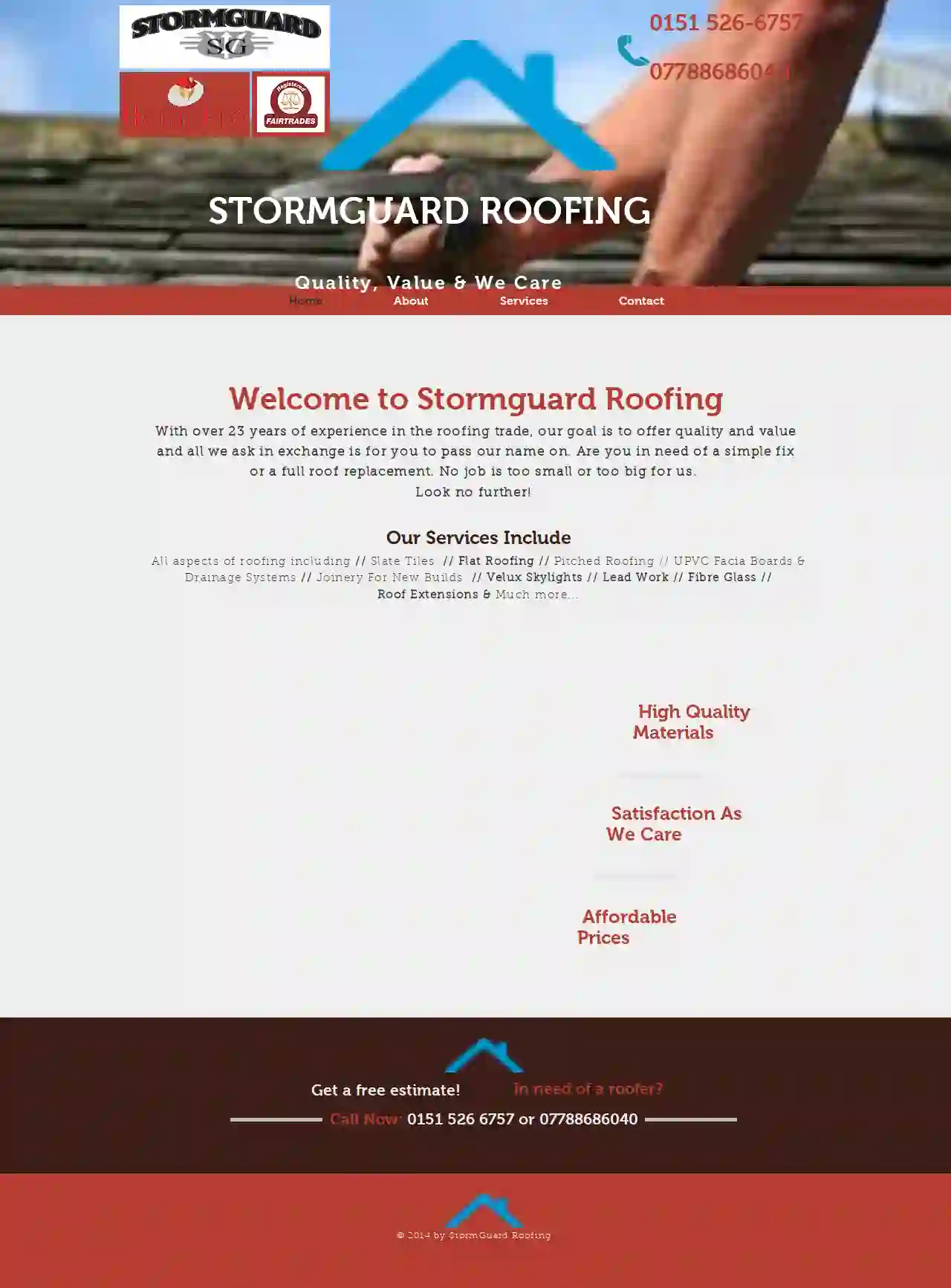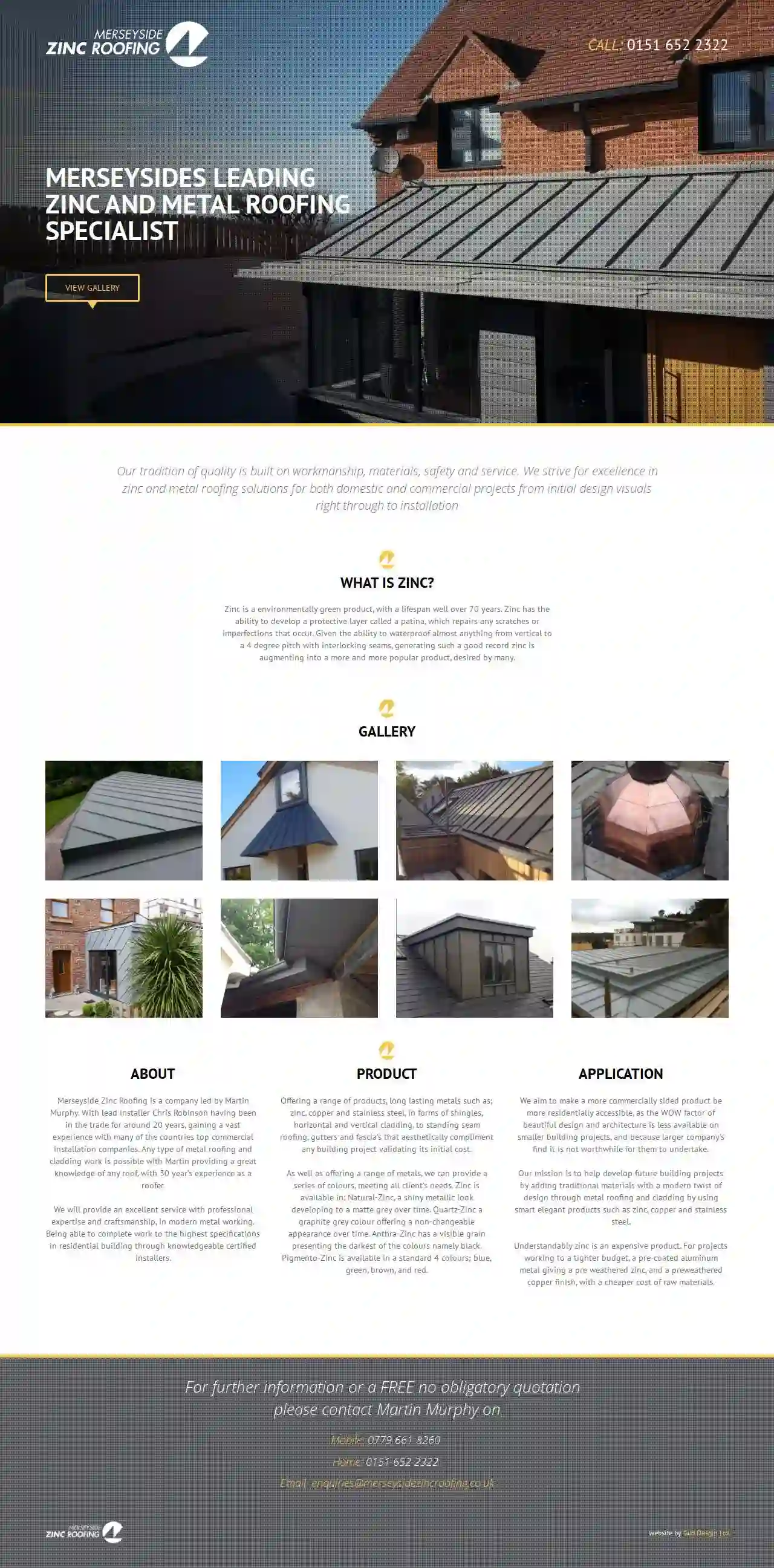Roofing Companies Roby
Best Roofing Contractor in Roby
Receive multiple Roofing Services quotes for your project today! Compare profiles, reviews, accreditations, portfolio, etc... and choose the best deal.

K.Schofield Roofing
54 reviewsLiverpool, GBAt K.Schofield Roofing we specialise in providing a high class standard of roofing workmanship for residential, commercial and industrial clients through-out Liverpool and Merseyside. We're dedicated to offering quality driven services at fair prices.
- Services
- Why Us?
- Gallery
Get Quote
Chris Moody Roofing
4.979 reviewsUnit 1 West Park View, Dudley, Cramlington, NE23 7AA, GBChris Moody Roofing and Building is a 'Checked and vetted' & 'Trading standards approved' family run business based in Wideopen, Newcastle. Trading since 2011, with over 15 years’ experience in the roofing and building trade. We specialise in all types of roofing and external building works. We pride Ourselves on our commitment to provide a Professional, Personal and Speedy service from quote to completion, whilst maintaining the highest quality of work and using top quality materials.
- Services
- Why Us?
- Accreditations
- Our Team
- Testimonials
- Gallery
Get Quote
S F Fitzpatrick | Roofer | Wirral
3.929 reviewsWirral, GBWirral Roofing Company SF Fitzpatrick Ltd have been providing roofing solutions for Wirral for the last 40 years. As a locally based Wirral roofing company we specialise in all types of pitched and flat roofs, guttering, roofing repairs and maintenance. All our works are completed to the highest standards and at competitive rates. As an established Wirral roofing company our residential projects range from flat roofing, slate roofs, tiled roofs, gutter repair and gutter replacement. Our commercial projects range from banks, estate agents, solicitors and energy companies with our works varying from Built Up Felt Roofing, Firestone Rubber, Asphalting and Lead Welding. RequestSurvey Are you preparing to buy a home or unsure about the condition of your current roof? SF Fitzpatrick offers a number solutions for Wirral roof surveys each carried out by one of our expert surveyors. Request your call back today.
- Services
- Why Us?
- Accreditations
- Gallery
Get Quote
JDC Roofing ®
513 reviewsLiverpool, GBEstablished in 2009, JDC Roofing Ltd is a nationwide roofing services provider. We are committed to delivering high-quality roofing solutions to our customers. Call us at 07590488064 or email us at [email protected] to learn more about our services.
- Services
- Why Us?
- Gallery
Get Quote
Jasway ltd (roofing & building)
51 reviewsSt Cuthberts Road, Holystone, Unit 4, Morne Depot, NE27 0DD, GBJasway Roofing & Building Roofing Northumberland and Tyne & Wear For Over 20 Years Jasway Limited have been providing Roofing and Building Services to both Domestic and Commercial clients across Northumberland and Tyne & Wear for over 20 years. We offer all aspects of roofing and building from minor remedial repair works to complete build packages.
- Services
- Why Us?
- Gallery
Get Quote
Stormguard roofing
4.69 reviewsLiverpool, GBSTORMGUARD ROOFING Quality, Value & We Care 0151 526-6757 07788686040 Our Services Include All aspects of roofing including // Slate Tiles // Flat Roofing // Pitched Roofing // UPVC Facia Boards & Drainage Systems // Joinery For New Builds // Velux Skylights // Lead Work // Fibre Glass // Roof Extensions & Much more... Welcome to Stormguard Roofing With over 23 years of experience in the roofing trade, our goal is to offer quality and value and all we ask in exchange is for you to pass our name on. Are you in need of a simple fix or a full roof replacement. No job is too small or too big for us. Look no further! High Quality Materials Satisfaction As We Care Affordable Prices
- Services
- Why Us?
- Gallery
Get Quote
Merseyside Zinc Roofing
52 reviewsBirkenhead, GBMerseyside Zinc Roofing is a leading specialist in zinc and metal roofing solutions for both domestic and commercial projects. We pride ourselves on a tradition of quality built on workmanship, materials, safety, and service. From initial design visuals to installation, we strive for excellence in every project we undertake. Zinc is an environmentally friendly product with a lifespan exceeding 70 years. It develops a protective patina layer that repairs scratches and imperfections, making it a durable and sustainable choice. Zinc's ability to waterproof surfaces from vertical to a 4-degree pitch with interlocking seams has made it increasingly popular. Led by Martin Murphy, our team boasts extensive experience. Chris Robinson, our lead installer, has over 20 years of experience working with top commercial installation companies. Martin himself brings 30 years of roofing expertise to the table. We are committed to providing an excellent service with professional expertise and craftsmanship in modern metalworking. We offer a range of long-lasting metals, including zinc, copper, and stainless steel, in various forms such as shingles, horizontal and vertical cladding, standing seam roofing, gutters, and fasciae. These products aesthetically complement any building project, justifying their initial cost. In addition to a variety of metals, we provide a range of colours to meet our clients' needs. Zinc is available in Natural-Zinc (shiny metallic look that develops into a matte grey over time), Quartz-Zinc (graphite grey with a consistent appearance), Anthra-Zinc (darkest colour with a visible grain), and Pigmento-Zinc (available in blue, green, brown, and red). Our mission is to make commercially-oriented products more accessible to residential projects. We aim to bring the WOW factor of beautiful design and architecture to smaller building projects, filling a gap left by larger companies who often find them unprofitable. We understand that zinc can be an expensive material. For projects with tighter budgets, we offer pre-coated aluminum that mimics the look of weathered zinc and copper at a lower cost. For further information or a FREE no-obligation quotation, please contact Martin Murphy: Mobile: 0779 661 8260 Home: 0151 652 2322 Email: [email protected]
- Services
- Why Us?
- Our Team
- Gallery
Get Quote
BBR Roofing Ltd
38 reviews2 Dacre Street, Bootle, L20 8DN, GBFrom humble beginnings over twenty years ago, BBR has developed from a family run roofing company to become a leading specialist in the roofing business, with particular expertise in roofing refurbishment. Why Choose BBR Roofing? ExpertiseBBR take on projects of all sizes and our skilled operatives are able to install virtually any type of flat or pitched roof system Find Out More ExperienceBBR Roofing have experience in working in all sectors of the market and have the capability to take on projects of any size View Our Projects KnowledgeOur technical experts are on hand to offer impartial, practical advice that will help make your roofing project a success Get in Touch “If you’re looking for specialist advice in any area of flat or pitched roofing then BBR Roofing can help.” Health & Safety Excellence on Every Project As principal contractors for many of our projects we are well aware of our responsibilities under CDM, and particularly the updated provisions of CDM 2015, to employ staff and operatives who have the right skills, knowledge, training and experience for the task in hand. To this end BBR Roofing maintain a comprehensive training schedule for all employees in order to achieve the highest standards of employee competence. Indeed, our recent (2015) Investor in People audit declared our training schedule to be “excellent”. At BBR Roofing training is given to each and every member of the team. The training and qualifications achieved depend on the role each person has within the company and their level of involvement in roofing projects. See the roles and qualifications here for a typical roofing job.
- Services
- Why Us?
- Gallery
Get Quote
Able Roofing Contractors (South)
GBAt Surrey Roofing Network, our members can deal with all aspects of domestic, commercial, and industrial roofing. Whether you need roof repairs, flat roofing, guttering, fascias & soffits, or any other roofing service, our team of experienced roofers is here to help. We cover all areas of Surrey, including Boxgrove Park. We understand that your roof is one of the most important parts of your home or business. That's why we only use the highest quality materials and workmanship to ensure that your roof is durable, reliable, and long-lasting. If you're looking for a reliable and experienced roofing contractor in Boxgrove Park, look no further than Surrey Roofing Network. We offer a wide range of services to meet your needs, and we're always happy to provide a free quote.
- Services
- Why Us?
- Gallery
Get Quote
MKS Roofing
517 reviews53 Cottingwood Green, Blyth, NE24 4TQ, GBMKS Roofing is a highly experienced roofing contractor serving Blyth and the wider North East region. We specialize in both commercial and residential roofing services, offering a comprehensive solution from design to completion. Our team prides itself on providing a highly personal and professional service. We install a variety of roofing types, including full roofs, GRP flat roofs, and UPVC fascias and guttering. We also handle roof repairs and specialize in the installation, maintenance, and repair of UPVC systems for your property. These UPVC services are designed for minimal maintenance and offer an effective and attractive solution for your home or business. MKS Roofing is committed to providing high-quality workmanship and customer satisfaction. We don't use high-pressure sales tactics, just friendly customer service and expert advice. Contact us today for a free, no-obligation quotation.
- Services
- Why Us?
- Testimonials
- Gallery
Get Quote
Over 12,314+ Roofing Businesses onboarded
Our roofing contractors operate in Roby and beyond!
Roofyng.co.uk has curated and vetted Top Roofers in Roby. Find a trustworthy pro today.
Frequently Asked Questions About Roofing Companies
- Roof size and complexity
- Roofing material chosen
- Local labor costs
- Accessibility of the roof
- Removal of existing roofing
- Additional features (skylights, chimneys, etc.)
- Age: If your roof is nearing or exceeding its expected lifespan, it's wise to consider replacement.
- Multiple Leaks: Several leaks or leaks that reappear after repairs suggest a widespread problem.
- Extensive Damage: Large areas of damaged, missing, or deteriorated roofing materials might be too costly or difficult to repair effectively.
- Sagging or Structural Issues: Sagging, deflection, or other structural issues indicate a compromised roof that needs replacement.
- Granule Loss (Asphalt Shingles): Significant granule loss indicates weathering and reduced protection.
- Curling or Buckling Shingles: Signifies age or improper ventilation.
- Increased Energy Bills: A poorly insulated roof can lead to higher heating and cooling costs.
What is fascia, and why is it important?
What is the difference between a roofer and a general contractor?
Roofer: Specializes in roof installations, repairs, and replacements. They have expertise in roofing materials, techniques, and safety practices specific to roofing.
General Contractor: Oversees and manages entire construction projects, including hiring and coordinating subcontractors, such as roofers, electricians, plumbers, etc. They handle overall project planning, scheduling, and budgeting.
For roofing projects, it's generally best to hire a roofing contractor who specializes in roof work.
How much does a new roof cost in the UK?
What are the signs that my roof needs to be replaced?
What is fascia, and why is it important?
What is the difference between a roofer and a general contractor?
Roofer: Specializes in roof installations, repairs, and replacements. They have expertise in roofing materials, techniques, and safety practices specific to roofing.
General Contractor: Oversees and manages entire construction projects, including hiring and coordinating subcontractors, such as roofers, electricians, plumbers, etc. They handle overall project planning, scheduling, and budgeting.
For roofing projects, it's generally best to hire a roofing contractor who specializes in roof work.
How much does a new roof cost in the UK?
- Roof size and complexity
- Roofing material chosen
- Local labor costs
- Accessibility of the roof
- Removal of existing roofing
- Additional features (skylights, chimneys, etc.)
What are the signs that my roof needs to be replaced?
- Age: If your roof is nearing or exceeding its expected lifespan, it's wise to consider replacement.
- Multiple Leaks: Several leaks or leaks that reappear after repairs suggest a widespread problem.
- Extensive Damage: Large areas of damaged, missing, or deteriorated roofing materials might be too costly or difficult to repair effectively.
- Sagging or Structural Issues: Sagging, deflection, or other structural issues indicate a compromised roof that needs replacement.
- Granule Loss (Asphalt Shingles): Significant granule loss indicates weathering and reduced protection.
- Curling or Buckling Shingles: Signifies age or improper ventilation.
- Increased Energy Bills: A poorly insulated roof can lead to higher heating and cooling costs.